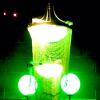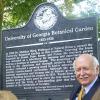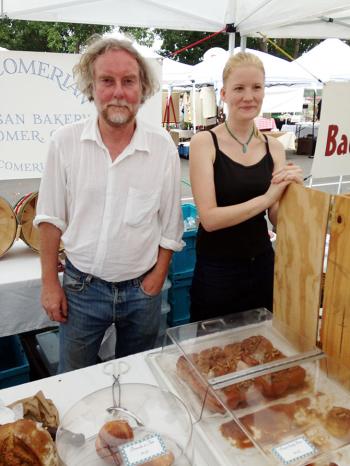Artisanal Bakers Search for the Perfect Loaf

Richard Saunders (left) gets ready to bake with assistant Austin Keyhoop.
For Richard Saunders, bread-making is both an art and a science.
Every Thursday and Friday during the farmers-market season, he presides over the command center that is the kitchen built onto the back of his house. He and his assistant, Austin Heykoop, mix, proof and shape the loaves of naturally leavened artisanal bread that he will sell on Saturday, entering data into the grid on a giant whiteboard on the back wall to make sure that each batch enters the wood-burning retained-heat oven at the proper time, in order to maximize the deliciousness and appearance of his breads and pastries.
Cooking with this kind of oven requires precision. After Saunders fires it up each Thursday, it builds up heat over a long period. The loaves will be baked as it gradually cools, so the order they go in is important. Focaccia requires a different temperature than the whole spelt or the cranberry-pecan bread.
“Imagine a graph of heat and time,” Saunders says as he explains the process, which bakers call “managing the curve.” He begins baking when the oven is around 550 degrees, starting with light and open breads like the semolina and working his way toward the loaves with seeds, nuts or fruits. By Sunday, the oven will be down to 350 degrees, and by the next Thursday it will still be at 180 degrees when he fires it up again.
“I know I’m a long way from making the perfect loaf of bread,” Saunders says. “Sometimes they come out really good, sometimes they’re horrible. This is all part of the art. There’s a science to all this, but there’s also all this art, in terms of what does the bread look like, feel like, how is it rising. Every day you have all of these variables in terms of humidity and temperature and heat of the oven: is the oven 20 degrees too hot, 20 degrees too cold, or is it the perfect temperature, or did I get distracted talking and leave the bread in too long? There are all sorts of pitfalls possible.”
This care with his breads seems to have paid off. Miche, Saunders’ business, has become an Athens Farmers Market favorite since he began participating in 2010. (He is skipping the market this weekend but will be back Aug. 17.)
“Miche bread is a special treat,” says Dylan Payne of Cedar Grove Farm, who often makes a point to pick up a loaf of Saunders’ “super seeded” bread during a free moment between helping his own customers. “The time he spends baking, the ingredients he uses, and his methods all result in a high-quality product.”
From COSMIC to the Kitchen
Baking is a departure from Saunders’ previous work. Before retiring in 2008, Saunders worked for the University of Georgia selling NASA-developed software through COSMIC, the Computer Software Management and Information Center. He has held a variety jobs over the years as he followed his interests, but many of them have reflected his love of science and nature. He holds a master’s degree from UGA in plant protection, which combined entomology, plant pathology and horticulture. He has taught math on the college level and briefly worked as a ninth-grade science teacher. He and his wife, Carol Myers, who is now dean of general education at Athens Tech, met in Arizona in the early 1980s while working in Arcosanti, an experimental town in the desert dedicated to exploring environmentally-sound architectural and city planning practices.
While the world of pastry-making and farmers-market vending may sound far-removed from the laboratory or the math classroom, baking has afforded Saunders plenty of opportunity for scientific inquiry. When he became interested in making naturally leavened bread a few years ago, the problem of breaking down the precise steps to achieve the perfect loaf led to a research program that involved extensive reading in the subject. Saunders immersed himself in books by food chemists and famous bakers as he conducted his experiments. He learned to work with starter cultures native to each grain and explored new ingredients.
“One thing about being retired is that I’m not trying to minimize my costs, I’m trying to make the perfect loaf of bread,” he says.
The quest for bread perfection is a collaborative project of bakers around the world. When Saunders was learning his craft, he found other artisans more than willing to share their knowledge with him.
Around the time he was interested in building a wood-fired oven, he visited his daughter in Vermont, where she was attending college, and a worker at the local food co-op directed him to a professional baker in New Hampshire who used a wood-fired oven. Saunders visited the baker, who lived in an idyllic enclave of organic farmers and food artisans who shared supplies with each other. The New Hampshire baker shared some tips, introduced Saunders to another baker in Freeport, ME, who had the specific kind of oven that interested Saunders and invited Saunders to come back for a visit. In the winter of 2009, Saunders returned to New England for a week and baked with both men. He joined the Bread Bakers Guild of America, which maintains a members-only listserv where bakers can share their expertise.
“Virtually everybody in this activity is incredibly generous of time and knowledge,” Saunders says, reflecting on his friend in New Hampshire, who also offered guidance while Saunders was preparing to become a farmers-market vendor. “Any recipe I wanted from him, any information he could give me, he was perfectly willing to give. There are no secrets. So I don’t have secrets either.”
Passing It On
In fact, Saunders’ success in his own baking endeavors allowed him to pay forward some of his expertise to another scientifically-minded baker in the area who was starting her own business.
His former assistant, Angel Cooper—now proprietor of her own artisanal bakery, The Comerian—hadn’t planned on a career in croissants. She holds a degree from UGA in cognitive science with a minor in math but found it difficult after graduation to find a job in Athens that would utilize these skills. As a hobby, she began selling pastries at the Comer farmers market while she considered her next move, since she loved to cook and bake.
During this time, Saunders and Myers attended a birthday party Cooper threw for her partner, Uwe Happek, who is a physics professor at UGA. For the brunch, Cooper decided to try her hand at croissants for the first time. Though croissants are difficult to make, they were a hit with her guests, and Saunders asked Cooper if she’d be interested in working as his assistant.
Cooper worked with Saunders for a year and sold her pastries alongside his bread. Her croissants were a big success as well, and as she and Saunders both increased their production and sales, they contemplated whether a double tent would be more appropriate, since they were outgrowing their space. But Cooper decided that she was ready to make the leap to a career of baking.
Her scientific background is not irrelevant to her work. “It’s very important to have an analytical mind if you want to be a baker,” she says. “It seems to be very common.”
This year, The Comerian has its own space at the market, and Cooper works out of the kitchen in an old restaurant building in Comer, which she and Happek are renovating to become a bakery, though she doesn’t have much free time between preparing for the Wednesday and Saturday farmers markets and filling other orders. Though the bakery isn’t ready yet as a retail space, customers in Comer often drop by to place orders with her and chat while she works.
Cooper makes all kinds of pastries, cakes and breads, but she is perhaps most famous for her croissants. Croissant-making is a delicate art. The dough is mixed on Thursday and chilled until the next day. On Friday, she makes butter blocks and undertakes a complicated sequence of folding before chilling the dough again and rolling it into a long sheet. Then she wakes up at 2 a.m. on Saturdays to begin baking the croissants for the market.
That schedule may sound extreme, but Cooper feels the sleepless nights are justified by the loveliness of a freshly baked croissant. “People really get it. It makes it worth it to me.”
Like Saunders, Cooper is meticulous about her ingredients. Everything used in her pastries is organic, from the certified naturally grown pecans to the sugar and spices. Organic baking supplies aren’t easy to buy in bulk. She and Saunders order together, since their flour must be shipped in.
“It’s hard to make an organic sticky bun,” she says, but farmers market patrons have responded enthusiastically. “They might not have the time to grow their own food or make their own croissants, but they know that if they were to do it themselves, this is what it would be.”
The Bread Boom
Bread is becoming something of a specialty in Athens, a town full of artisans of all stripes. In addition to Miche and The Comerian, patrons of the Athens Farmers Market can also enjoy Backyard Bread. Beyond that, there’s also Luna Bread and Big City Bread.
Within the next few weeks, Athenians will have another option for artisanal pastries and European-style crusty breads when the Independent Baking Co. opens in Five Points.
Like Saunders and Cooper, owner Thom Leonard did not set out to be a baker. But in his case, bread has been his occupation for much of his adult life.
In 1971, while majoring in anthropology at Fairhaven College in Washington state, he took an elective in “the science of cottage industries,” which explored various homestead arts. A neighbor in his building baked bread every Thursday. Leonard decided to try it himself for a class project, and he became fascinated. After that, he worked in bakeries for several years and later owned his own bakery, WheatFields, in Lawrence, KS, which is still in operation. WheatFields was included on a USA Today list of the top 10 U.S. artisinal bakeries, and one of Leonard’s recipes was featured in the book Artisan Baking Across America by Maggie Glezer.
Many of the Independent Baking Co.’s ingredients will be organic. Leonard also plans to use some heirloom varieties of wheat in the bakery and hopes to move toward relying on local varieties of wheat. He hopes to explore the possibility of using green energy to power his equipment, as well.
While the field is becoming more crowded, Saunders’ description of the warmth of the baking community seems to be true. Cooper, Saunders and Leonard now order their organic flour together, and their passion for baking is a basis for friendship. “We’re more colleagues than competitors,” Leonard says.
With all the delicious options available around Athens, locally made bread is surely worth your hard earned dough.
Keywords
More by C. J. Bartunek
-

Chapter 13: A Wild Rumpus
The Athens of Georgia
In the low lighting of the 40 Watt under the string lights and spooky streamers, his Machiavellian impulses were confused.
-

Remembering UGA's First Botanical Garden
A Garden of Eden
Just a few traces remain, but now the old botanical garden has a new marker.
-

Chapter 12: Fright Night
The Athens of Georgia
Why was he still in Athens? His life there obviously sucked.










comments